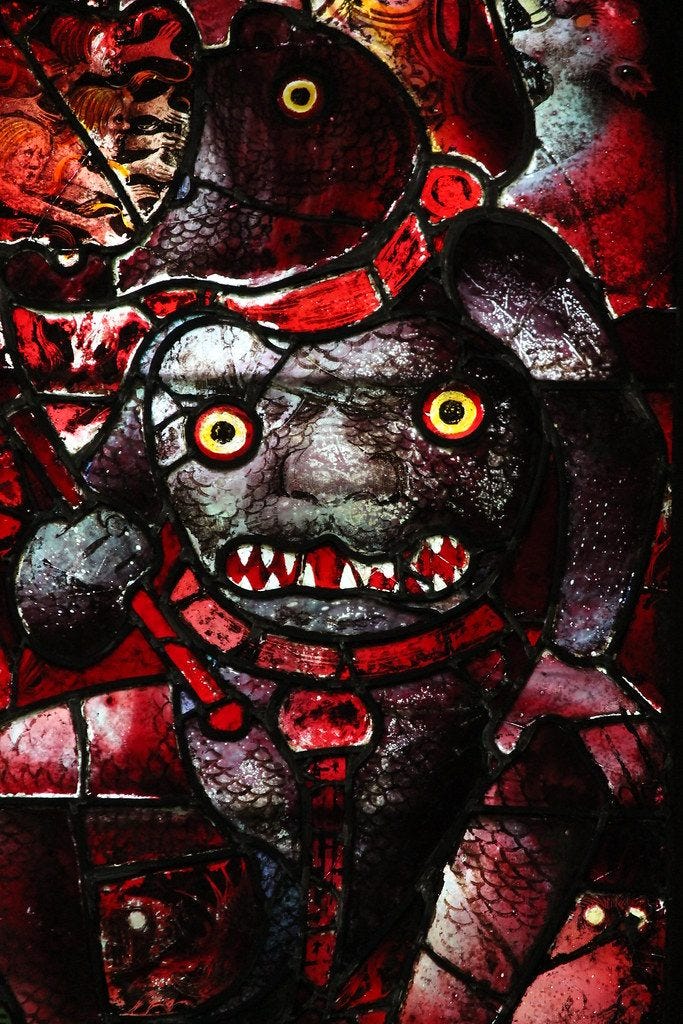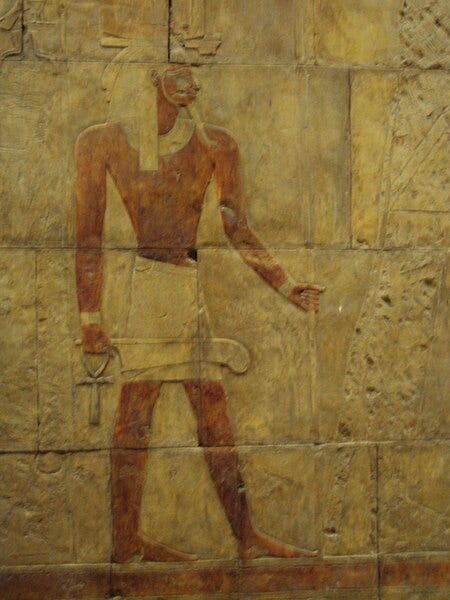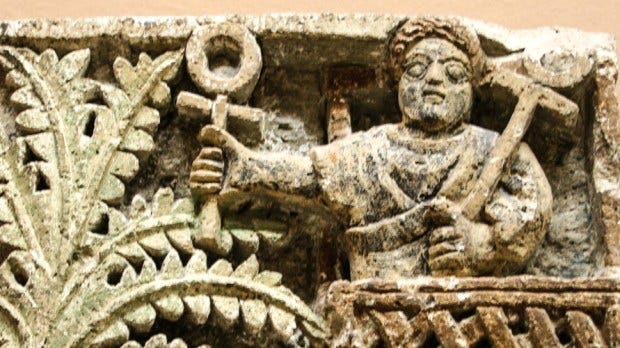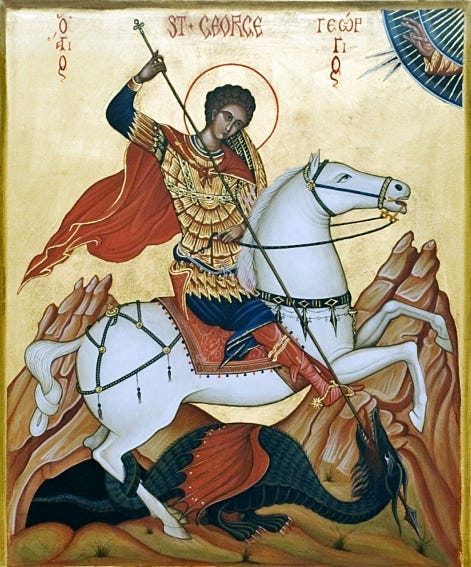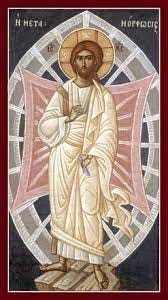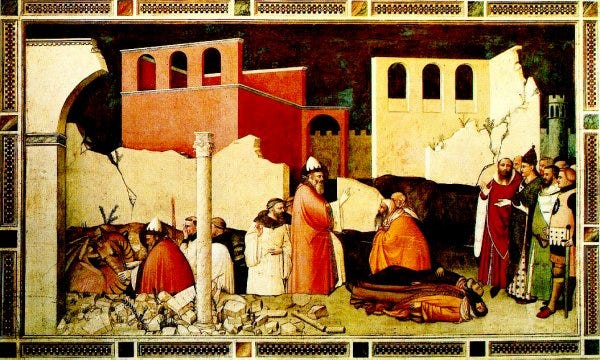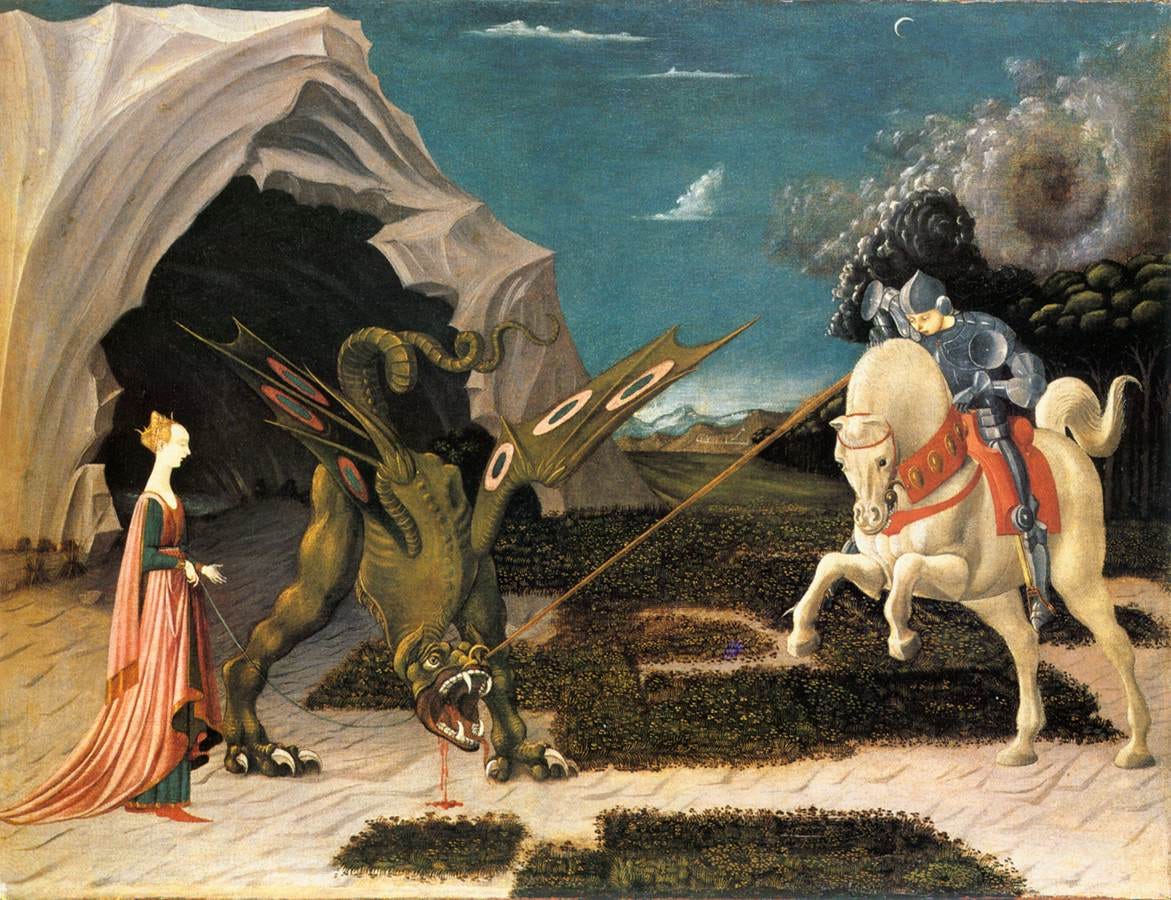Declare, Andrew Hale (part 2)
Hale Hunting Leviathan
The bearded man smiled. “My people and I are secure from judgment. We have made a covenant with the Destroyer of Delights, the Sunderer of Companies, he who lays waste the palaces and peoples the tombs. We stay here. We do not go on, we do not face —”
The man paused, so Hale ventured to complete the thought. “Consequences,” Hale suggested softly. “Retribution.”
“Leveling. We remain distinct.” 1
In the first half of this series, I discussed the meaning of the name “Andrew” and how Tim Powers uses the associations with that name to form the character of Andrew Hale in Declare. In the second half, I will explore the meaning of Andrew’s last name, “Hale”, and how Powers uses these meanings as a pattern to depict both allegiance with God and His Divine Judgement.
“You are, clearly, acquainted with the power I speak of,” came his voice from behind the dim red coal of the cigar, “and you are at this moment a knight without a lord. Will you listen to persuasions?”
“Yes. Listen.”2
The name of “Hale” is an interesting choice for a surname. It may seem arbitrary, but by digging into the etymologies of the various uses and homophones of the word we will realize that this name fits the themes of the story very well. By now, we know that Powers is very careful when crafting his stories. He usually comes up with the plot first by figuring out the secret, magical history behind some historical event, and then creates a protagonist who would fit that story.
In the case of Declare, he created an English spy turned double agent in a world of Leviathan hunting.
On Easter, Andrew and his mother would attend midnight Easter Vigil Mass in Stow-on-the-Wold, and then after they had driven back home, before the little car’s motor had cooled off, all three of them would climb into the vehicle and drive to the dawn service at the Anglican church in Fairford. Little Andrew would sit yawning and uneasy through the non-Catholic and therefore heretical service, sometimes peering fearfully at the medieval stained-glass western window, where a huge Satan was depicted devouring unhappy-looking little naked sinners; Satan’s body was covered with silver scales, and his round torso was a grimacing, pop-eyed face, but it was the figure’s profiled head that howled in the boy’s dreams — it was the round-eyed head of a voracious fish, almost imbecilic in its inhuman ferocity.34
As in the previous post, I include many spoilers so I would strongly recommend reading Declare at least once before continuing.
There are various meanings behind the name “Hale”. The simplest way it can be used is as an adjective and often pairs with the word “hearty” to mean “in good health, robust”5. It can be used in reference to healthy older people. When tied with the fisherman associations with the name “Andrew”, it refers to Andrew Hale being an older (he is in his 40’s in the most recent sections of the book) yet a robust and healthy (hale and hearty) fisherman. It is also interesting because Powers usually puts his characters through trials that leave them missing eyes or fingers, but not Andrew Hale. He is physically intact.
The adjective can also mean “entire”6, which Andrew Hale is not in some sense. He is not complete or whole because he shares at least part of his identity with the infamous spy, Kim Philby, but more on that later. Through a series of rituals too complex to get into here, Andrew and Philby share something like a psychic link and seem to split attributes. Andrew received a fierce loyalty to his country, and to Elena, while Philby received the desire for a domestic life with a wife, or wives in Philby’s case, and children, but without the necessary fidelity to make a marriage last.
“So Philby and I are two halves of one person.”
“Well, in a sense.” Hartsik walked back to his chair behind the desk and sat down. “We suspect that you’ve been able to hear each other’s thoughts, in the season when the sky has assumed the definition of you; and probably you dream each other’s dreams then. And you do appear to —” Hartsik paused, awkwardly.
“Don’t hesitate,” Hale said, “to add insult to injury.”
“Well, Philby appears to have got — this is imprecise, you understand, armchair speculation — he appears to have got all the family feeling, the — practically obsession, in his case — with hearth-and-home, parents and wife and children. He’s been married three times, and he’s got five children. He has, though, no comprehension of loyalty, duty. Those qualities all seem to have flowed your way.”7
Oddly enough, “hale” can also be used as a verb, although it is not used much that way in modern English. In Middle English, hale meant “drag, pull”8 and referred to the use of arrows, bowstrings, reins, swords, anchors, and other, similar items. It is also used to “draw (someone) from one condition to another.”9 This is relevant because, in order to survive face-to-face encounters with the djinn, spies are given amulets in the shape of ankhs to act as anchors for the djinn’s attention. Certain symbols can also impose changes onto their patterns and kill them.
This needs a bit of an explanation.
The djinn are pure spirits and basically “think” in patterns and motions. Speaking to the djinn is a dangerous thing to do and the sheer psychic force of their presence and thought is enough to rip someone’s mind to shreds and crush their identity (and their bodies).
“Their thoughts are kinetic macroscopic events,” and a British man’s voice from the unperforated earpiece, clearly enough for Philby to hear through the bandages, “wind and fire and sandstorms, gross and literal. What the djinn imagine is done: for them to imagine is to have done it, and for them to be reminded of it is for them to do it again. Their thoughts are things, things in motion, and their memories are literal things too, preserved for potential reference — wedding rings and gold teeth looted from graves, and bones in the sand, and scorch-marks on floors, all ready to spring into renewed activity again at a reminder…To impose a memory-shape onto their physical makeup is to forcibly impose an experience — which in the case of a Shihab meteorite’s imprint, is death.” 1011
Powers uses the fact that “anchor” sounds similar to “ankh”, so he constructs the plot under the assumption that they are related in both form and purpose. The combined loop and cross focus the attention of the djinn by imposing the pattern on them. Their wild attention is drawn down, like an anchor, and gives the wielder some measure of control over them, at least temporarily and in limited circumstances. Again, this all ties in to the meaning of “hale” as dragging and/or pulling something or someone from one condition to another; from chaos and destruction to focused attention, subservience, and possibly death.
Cassagnac just shuddered and did not look away from the advancing whirlwind, but his hand reached into his coat and pulled out a doubleedged commando dagger. Hale took it from him and cut free a foot-and-a-half length of the tangled rope; then, working rapidly with trembling fingers, he stripped long fibers from the remaining rope-end and used them to tie the short length to the crosspiece and pommel of the dagger, in a loop.
The result was an ankh, though the loop was bisected by the dagger’s grip. Hale could hear Elena loudly reciting the Ave Maria in Spanish behind him, and took a deep breath and tried to whisper some syllables of the Latin Pater Noster — and then he gripped the dagger by the base of the blade and stood up, lifting the makeshift ankh over his head — and he had to push the thing up through the air, as if through magnetic resistance.
For an instant all thought and identity were blown out of Hale’s head, and his knees sagged and he would have fallen if the ankh had not suddenly been pulling upward in his fist; then the intensity of the thing’s surprise was abruptly gone, and Hale was again self-aware, a tiny sentient presumption in the face of something like a god.
He staggered and swung his upraised arm to the left to steady himself — the ankh could only be dragged slowly through the nearly unyielding air, like tugging at a big gyroscope — and with a shrill whistling that lashed spray up from the street, the whirlwind leaned over that way, seeming to overbalance the sky.12
There is also the fact that an Egyptian ankh, a symbol of eternal life, has the same basic shape as the Christian cross13. Christ Himself is the axis mundi14, the connection between heaven and earth, Who fixes chaos into place and destroys death. Andrew Hale uses an ankh to survive encounters with the djinn by anchoring their attention with a symbol of life that has resonances with the Christian symbol of eternal life, the Cross. The Cross fixes the attention of the chaotic djinn, in a similar way to St. George fixing the chaotic serpent with the thrust of his lance. Andrew initially seeks to use the ankh, not only to survive encounters with the djinn, but command them like the sorcerers of old. This destructive pride and desire was mentioned in the first post of this series, so there is no need to re-address that here.
We’re not done! Powers loves to use words that sound similar to layer the meanings on top of one another. “Hale” is also a homophone with the weather phenomenon, hail, but it is not limited to that. Hail the noun is characterized by spherical pellets of frozen rain that fall during storms. Depending on the size, hail can be a very dangerous weather event, which is probably why it is representative of God’s wrath in Scripture. Hail could take lives, slaughter cattle, and destroy crops.
From Exodus 9:22-2515:
And the Lord said to Moses: Stretch forth thy hand towards heaven, that there may be hail in the whole land of Egypt, upon men, and upon beasts, and upon every herb of the field in the land of Egypt. And Moses stretched forth his rod towards heaven, and the Lord sent thunder and hail, and lightning running along the ground: and the Lord rained hail upon the land of Egypt. And the hail and fire mixed with it drove on together: and it was of so great bigness, as never before was seen in the whole land of Egypt since that nation was founded. And the hail destroyed through all the land of Egypt all things that were in the fields, both man and beast: and the hail smote every herb of the field, and it broke every tree of the country.
To hail someone is “to greet or address”16 them, “to call to from a distance”17, and can be used to identify them and their origin (i.e., Where do you hail from?18). Interestingly, this is yet another connection to the fisherman theme as the phrase, “hail from” probably originated with seamen or boatmen.19
Admittedly, this might be a weaker connection, but there are still events in the book that point to this meaning. Specifically, a figure is spotted by Philby in Beirut, beckoning to him:
At last they had doglegged south on Chouran Street and were driving along the cliff road, past Lord’s Hotel and the Yildizlar Restaurant, with the dark-indigo Mediterranean on their right. Philby could see the two enormous rocks out in St. George’s Bay — traditionally the site where England’s patron saint had killed the dragon. The weary St. Kim, he thought, will settle for just hiding from the dragon.
…
"Who’s that?” Philby shouted.
He grabbed her arm with his left hand, and with his right he was pointing at the taller of the two rocks out in the bay — for he had just noticed a silhouetted figure standing in the meadow on the inaccessible top. It was far too remote for him to be able to tell if it was a man or a woman…but one of its arms was waving. It was beckoning.20
It is strongly implied in this scene that the waving figure is, in fact, Andrew Hale. In another location at the same time, Hale is explaining (pinning down/fixing) the nature of the djinn, with Philby as an eavesdropper, which was quoted already. I mentioned St. George spearing the serpent already, but Hale’s explanation of the nature of the djinn occurs when Philby is at St. George’s Bay in Beirut, which is the traditional site where St. George fought the dragon.
There is also the call and response phrases that the djinn respond to that could be connected to “hailing someone:”
O Fish, are you constant to the old covenant?
Return, and we return; keep faith, and so will we.21
The phrase, “hail of something”22, is also important here as it defined as “a lot of things or remarks, thrown or shouted at someone at the same time.” For example, a hail of insults, arrows, or bullets. In Declare, Andrew Hale is given a derringer full of bird-shot to use against the djinn.
“How?” Hale waved at the lead balls on the table. “Shoot them with these?”
“Yes — a lot of them, cast in a much smaller scale. Bird-shot caliber. Several shops in Beirut are now manned with clerks who will sell you prepared shot shells and an American derringer, chambered for the American .410 shell and rifled to the right so that the pellets will emerge in a pattern that’s turning clockwise as it expands, to match the spinning of the djinn if you fire upward. The djinn will assimilate the shot pellets — which is to say, assimilate the experience of death.”23
What shape is on the bird-shot? No one should be surprised at this point at the answer:
One of the balls wobbled across and clinked against Hale’s coffee cup. He slowly reached out and picked it up between his thumb and forefinger. It was egg-shaped, and though it was heavy it forcibly reminded him of the black glass pellets he had found at Wabar and had later thrown down in the bomb shelter below Ararat.
Peering more closely at the thing, he noticed that it was incised with two fine equator lines at right angles, one around the middle and one around the ends.
“Three-dimensional crosses,” said Hartsik, “or wheels buggered out of usefulness by being folded into three dimensions, if you like, completed — on an oval, which is a sphere with two internal hub-points, two foci. Mathematical severance of the geometric core. It’s the experience and expression of end-of-message, for djinn and it will impose shut-down if it’s delivered spinning clockwise fast enough to match their own rotation, so that it becomes an integrated part of them. They can’t help but take it in — they’re hypnotized by right angles and ovals, like the shape of an ankh. Morbid of them, really.”24
The bird-shot with the lines are three-dimensional ankhs or, more to the point, three-dimensional crosses imprinted on an oval. I don’t know if this is intentional on Powers’ part, but ovals, or mandorlas25, are used in Eastern Christian iconography to depict Christ’s divine majesty. They are framed around Christ’s entire body and typically have three concentric circles, unlike the halo, which is just around the head.
It is this barrage (hail) of tiny oval-crosses, traveling upward, that impose the pattern of death on the djinn.
Before we get to the climax of the story, we need to cover two more related aspects of the word “hail.”
First, is the phrase, “hail from”, or the origin of a person. I’m going to stretch this connection just a bit to include parentage. In Andrew Hale’s case, where and when he was born, and more importantly, the identity of his father, is very important to the plot of Declare. Andrew’s real birthday and the identity of his father were kept a secret from him until it was revealed to him towards the end of the book.
Throughout most of his adult life, Andrew believed his birthday to be January 6th, the Feast of the Epiphany, or an anti-Epiphany in this case, and that his father was some disgraced Catholic priest who broke his vows with his mother while in Palestine. In reality, Andrew was born in Palestine to the British Arabist, St. John Philby, who is also Kim Philby’s father. Andrew and Kim are half brothers born ten years apart on the same day, December 31st.
“I don’t believe your father is a C-Cath-cth — a priest,” said Philby. “Was he, is he, in the s-secret service? Drummond’s is the preferred secret service bank. Theodora could h-h-hardly be your father — who is?”
“I don’t know,” said Hale clearly.
Philby’s pouchy face was still cheerful, but his voice was strident and almost angry as he said, “You were born in P-Phh — fucking — Palestine, allegedly on the Feast of the Epiphany — and you’re a, a C-tho-lic, Roman variety, Papist! — ‘Our Father which art in Amman, Hajji be thy name!’ — so you m-must know that Ep-p-piphany is when the Three Why-Wise Men arrived at last in Bbbeth!-lehem! just south of Jerusalem, ‘following yonder star.’ He took a deep breath and let it out, and then gave Hale a bright, boyish smile. “True?”26
The concealment of Andrew (and Kim’s) real birth date is important because December 31st is also the feast of St. Sylvester.27 According to the Golden Legend, St. Sylvester is another dragon slaying saint like St. George. The SIS and Andrew’s mother hid Andrew’s real birthday because it would have revealed him to be the dragon (djinn)-slayer along with his half-brother, Kim Philby.
The other, very much related, aspect of the word “hail” is that of allegiance and loyalty. Not only that, but there is also the connection to the Angelic Salutation: “Hail (Mary), full of grace; the Lord is with you” from Luke 1:28. Marian devotion is central to Elena’s character as the Our Father (Pater Noster) prayer is to Andrew Hale.
Andrew Hale has loyalty in abundance but is he always serving the right master? When Andrew was a boy, immediately after he received his First Communion, his mother told him that they need to go meet his “godfather” who turns out to be, essentially, the British Crown operating through the ultra-secret agency, the SIS. Hale’s mother was very grateful to the SIS because they got both her and Andrew out of Cairo.
But first Andrew’s mother crouched beside him, the hem of her linen dress sweeping the scuffed wood floor, and she licked her fingers and pushed back the boy’s unruly blond hair. “These are the people who got us home from Cairo,” she said quietly, “when…Herod…was looking for you. And they’re the King’s men. They deserve our obedience.”28
After Andrew’s mother died, the SIS operated under their role as his “corporate godfather”, and took over his education and spiritual formation. They began by taking him out of the Jesuit run boarding school and putting Andrew in a more secular school instead and adding German to the curriculum. The SIS trained him, and basically raised him, so the Crown, specifically SIS agent James “Jimmy” Theodora, became his pseudo-father (and mother), not to mention something like a god, Hale’s “highest good”, and source of morality.
An example of this is shown in a scene where Hale and his Muslim, Bedouin friend, Salim Bin Jalawi, are outside of Wabar in Saudi Arabia, they use their ankhs to repel and destroys the ghosts of the djinn that still haunt the wastes. Here, Hale is not yet acting as God’s good servant, but England’s first.
The Arab had retrieved the ankh Hale had given him and freed it from the linen cloth, and now he held it up and then slowly forced it over to his right; and with a hard clang the stone on his side broke into two pieces that toppled apart and thudded heavily into the sand, flinging up a cloud of dust.
Salim bin Jalawi looked back at Hale, his eyes bright. “In whose name do we…kill the ghosts of angels?”
“In the name of…George the Sixth of England!” 29
Furthermore, SIS training involves reciting a litany, similar to what godparents say during infant baptism, of what the agents are required to do in the service of the Crown. Would you break the laws of England? Would you kill your own brother? Andrew’s answer to all of these questions was an unhesitating “yes” until he fell in love with Elena and started keeping her involvement out of his reports to Theodora in order to protect her since she was a Communist agent. In fact, it was Andrew’s and Elena’s mutual love for one another that began wearing away their very flawed ideological commitments and led both of them to re-embracing the Catholic faith.
Andrew treats the SIS, the Crown, and Theodora as substitute parents, especially to replace his father. These “pseudo-fathers” cynically use Hale to achieve their own ends, even if their ends, though not their means, the destruction of the djinn, are noble. Hale struggles throughout the story to even say the Pater Noster, the bold acknowledgment that God is our true father, the prayer being reduced to fragments and whispers as the words try to escape his lips.
We’re nearing the end of this essay, so I will try to sum up everything we have covered so far and how it ties in with the climax of the novel, the final confrontation with the djinn on the top of Mt. Ararat.
Hale’s identity recoiled from the memory, and for one teetering moment, his self was his own. He hastily made the sign of the cross, clanking the derringer barrel against his snow-goggles as he shouted, “In the name of the Father!” out into the air that was incapable now of carrying any merely human voice — and then he pointed the blunt little steel barrel up at the angel —
And he pulled the trigger.
Even as he did it, his mind screamed in protesting grief and loss. What you might have had —!
In slow motion his fist moved up with the recoil, and a churning smear of fire hung in the air. He thought he heard a groaning wail from far behind him — it might have been Mammalian’s voice, Dopplered down to a bass register.
Slow as a flight of arrows the shot pattern was spreading out as it rushed up into the sky, its pattern rotating to the right as it expanded. The light of the towering figure became the enormous flare of an explosion, but Hale levered back the hammer of the little gun and fired the second shell. Again the shot sped visibly through the billowing air, like an expanding wheel turning. 30
Andrew Hale is an instrument of God’s wrath and judgement on the chaotic, leviathan-esq dragons that haunt this novel. This is shown through the various meanings behind the word “hale”, and the homophone “hail”, of that character’s last name. The ignominious circumstances regarding Andrew’s birth on December 31th, the end of the calendar year, means that he is God’s agent in ending the reign of these devils and bringing about their destruction. The ties to St. Sylvester and St. George point to both Hale and Philby being, admittedly reluctant, dragon slayers. In fact, I believe they are the only two characters in Declare that actually say the name of Jesus.
Andrew Hale and Kim Philby being present together in the final confrontation on Mt. Ararat is signaled by “hale” meaning complete, entire, and whole. The phrase “hale and hearty” is also often used for older persons and the name “Andrew” associates the name with fisherman themes. They both hail from Palestine and share the same birthday and father, but both men share a sort of animosity toward St. John Philby.
Andrew uses the derringer, a very small gun with only two rounds, filled with oval-shaped bird-shot etched with three dimensional crosses on the djinn. These crosses, surrounded by Christ’s majesty, impose the pattern of death onto the djinn and move (drag, pull) them from one state to another. The multiplicity and shape of the bird-shot connects to a barrage of hail, the weather event, and an instrument of God’s wrath and judgement.
Andrew hails God the Father by shouting God’s name as he pulls the trigger, thus declaring his allegiance with God and finally rejecting Satan and all his works and pomps. He also implicitly acknowledges God as his original Father, origin (hail from), and source of all things. Andrew Hale, along with Kim Philby, have fulfilled their roles as God’s appointed fishermen of these quasi-aquatic, dragon-like leviathans.
I will leave you with a final quote from Scripture that I think sums up the masterpiece that is Declare. It is a quote from Isaiah that may have been in the back of Powers’ mind when he was constructing this story.
Isaiah 28:15-18 (The Catholic Study Bible Second Edition)31
“You have declared, “We have made a covenant with death,
with Sheol we have made a pact;
When the raging flood passes through,
it will not reach us;
For we have made lies our refuge,
and in falsehood we have found a hiding place,”
Therefore, thus says the Lord God:
See, I am laying a stone in Zion,
a stone that has been tested,
A precious cornerstone as a sure foundation;
whoever puts faith in it will not waver.
I will make a judgement a measuring line,
and justice a level.
Hail shall sweep away the refuge of lies,
and waters shall flood the hiding place.
Your covenant with death shall be canceled
and your pact with Sheol shall not stand.
When the raging flood passes through,
you shall be beaten down by it.
Powers, Tim (2001). Declare (2013 William Morrow ed.). HarperCollins Publishers.
Ibid.
Ibid.
Atlas Obscura (December, 2021). Stained Glass Demons of Fairford. In Atlas Obscura. Retrieved from March 22, 2024 from https://www.atlasobscura.com/places/fairford-stained-glass-demons
Online Etymological Dictionary (n.d.). hale. In Online Etymological Dictionary. Retrieved March 22, 2024 from https://www.etymonline.com/word/hale#etymonline_v_1385
Ibid.
Powers, Tim (2001). Declare (2013 William Morrow ed.). HarperCollins Publishers.
Online Etymological Dictionary (n.d.). hale. In Online Etymological Dictionary. Retrieved March 22, 2024 from https://www.etymonline.com/word/hale#etymonline_v_1385
Ibid.
Powers, Tim (2001). Declare (2013 William Morrow ed.). HarperCollins Publishers.
Aleteia (July, 2017). Wait, why is there an Egyptian ankh in a Catholic church? In Aleteia.org. Retrieved March 22, 2024 from https://aleteia.org/2017/07/07/wait-why-is-there-an-egyptian-ankh-in-a-catholic-church/
Powers, Tim (2001). Declare (2013 William Morrow ed.). HarperCollins Publishers.
Aleteia (July, 2017). Wait, why is there an Egyptian ankh in a Catholic church? In Aleteia.org. Retrieved March 22, 2024 from https://aleteia.org/2017/07/07/wait-why-is-there-an-egyptian-ankh-in-a-catholic-church/
Merriam-Webster (n.d.). Axis mundi. In Merriam-Webster.com dictionary. Retrieved March 22, 2024 from https://www.merriam-webster.com/dictionary/axis%20mundi
Douay-Rheims Bible Online (n.d.). Exodus Chapter 9. In Douay-Rheims Bible Online. Retrieved March 22, 2024 from https://www.drbo.org/chapter/02009.htm
Online Etymological Dictionary (n.d.). hail. In Online Etymological Dictionary. Retrieved March 22, 2024 from https://www.etymonline.com/word/hail#etymonline_v_41523
Ibid.
Ibid.
Ibid.
Powers, Tim (2001). Declare (2013 William Morrow ed.). HarperCollins Publishers.
Ibid.
Cambridge Dictionary (n.d.) A hail of something. In Cambridge Dictionary. Retrieved March 22, 2024 from https://dictionary.cambridge.org/us/dictionary/english/hail-of
Powers, Tim (2001). Declare (2013 William Morrow ed.). HarperCollins Publishers.
Ibid.
Aleteia (August, 2017). How geometry was used to express Christian truths in art. In Aleteia.org. Retrieved March 22, 2024 from https://aleteia.org/2017/08/25/how-geometry-was-used-to-express-christian-truths-in-art/
Powers, Tim (2001). Declare (2013 William Morrow ed.). HarperCollins Publishers.
Fish Eaters (n.d.). Feast of Pope St. Sylvester I. In Fisheaters.com. Retrieved March 22, 2024 from https://www.fisheaters.com/customschristmas6.html
Powers, Tim (2001). Declare (2013 William Morrow ed.). HarperCollins Publishers.
Ibid.
Ibid.
Catholic Study Bible, 2nd Ed. (2011). Isaiah Chapter 28. Oxford University Press.


